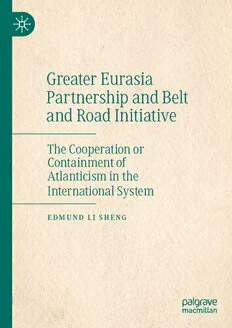
Greater Eurasia Partnership and Belt and Road Initiative: The Cooperation or Containment of Atlanticism in the International System PDF
139 Pages·2023·1.973 MB·English
Most books are stored in the elastic cloud where traffic is expensive. For this reason, we have a limit on daily download.
Preview Greater Eurasia Partnership and Belt and Road Initiative: The Cooperation or Containment of Atlanticism in the International System
Description:
In this book, Eurasia will be discussed in the context of the Greater Eurasian Partnership proposed by Russia, the “eastward” transformations spurred by Neo-Eurasianism and the Greater Eurasian Partnership, and cooperation with China through the BRI, while related countries of Atlanticism was used to described the U.S., Europe, and their allies. The Greater Eurasian Partnership proposed by Russia is an initiative with specific diplomatic considerations, economic development strategies, and geopolitical implications. The initiative represents an attempt by Russia to shift foreign policy thinking, which has traditionally focused on alignment with the U.S. and the West. The Greater Eurasian Partnership contains both short-term strategies to cope with Western pressure and long-term strategic goals for building a new international and regional order. What this portends for the future of Sino-Russian relations is of interest to geopoliticians, economists and journalists.
See more
The list of books you might like
Most books are stored in the elastic cloud where traffic is expensive. For this reason, we have a limit on daily download.
